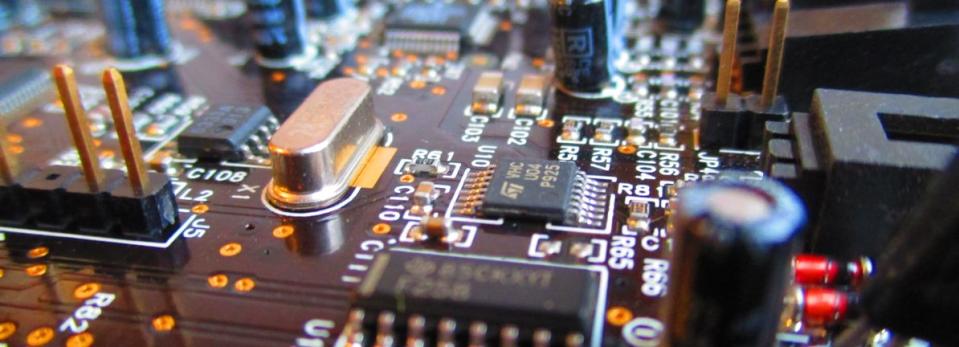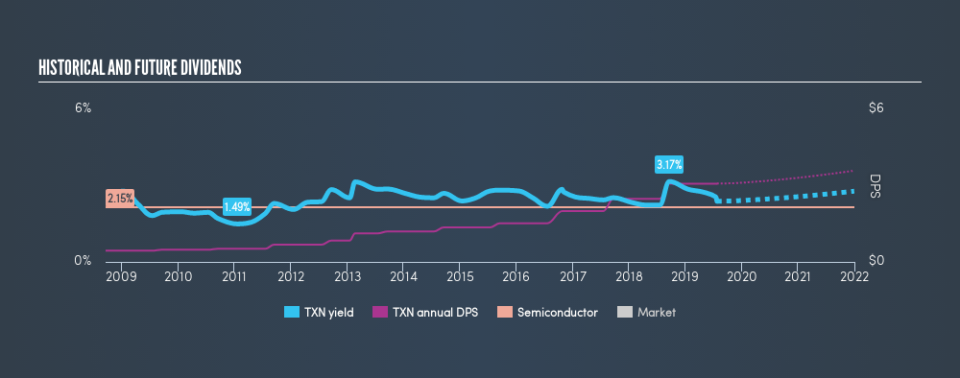Texas Instruments Incorporated (NASDAQ:TXN) Passed Our Checks, And It's About To Pay A 0.6% Dividend

It looks like Texas Instruments Incorporated (NASDAQ:TXN) is about to go ex-dividend in the next 4 days. You will need to purchase shares before the 30th of July to receive the dividend, which will be paid on the 12th of August.
Texas Instruments's next dividend payment will be US$0.77 per share, and in the last 12 months, the company paid a total of US$3.08 per share. Last year's total dividend payments show that Texas Instruments has a trailing yield of 2.4% on the current share price of $129. Dividends are an important source of income to many shareholders, but the health of the business is crucial to maintaining those dividends. So we need to investigate whether Texas Instruments can afford its dividend, and if the dividend could grow.
See our latest analysis for Texas Instruments
Dividends are usually paid out of company profits, so if a company pays out more than it earned then its dividend is usually at greater risk of being cut. Texas Instruments paid out 52% of its earnings to investors last year, a normal payout level for most businesses. Yet cash flow is typically more important than profit for assessing dividend sustainability, so we should always check if the company generated enough cash to afford its dividend. Fortunately, it paid out only 47% of its free cash flow in the past year.
It's encouraging to see that the dividend is covered by both profit and cash flow. This generally suggests the dividend is sustainable, as long as earnings don't drop precipitously.
Click here to see the company's payout ratio, plus analyst estimates of its future dividends.
Have Earnings And Dividends Been Growing?
Companies with consistently growing earnings per share generally make the best dividend stocks, as they usually find it easier to grow dividends per share. If earnings fall far enough, the company could be forced to cut its dividend. That's why it's comforting to see Texas Instruments's earnings have been skyrocketing, up 24% per annum for the past five years. The current payout ratio suggests a good balance between rewarding shareholders with dividends, and reinvesting in growth. Earnings per share have been growing quickly and in combination with some reinvestment and a middling payout ratio, the stock may have decent dividend prospects going forwards.
Another key way to measure a company's dividend prospects is by measuring its historical rate of dividend growth. In the last 10 years, Texas Instruments has lifted its dividend by approximately 21% a year on average. It's great to see earnings per share growing rapidly over several years, and dividends per share growing right along with it.
Final Takeaway
Has Texas Instruments got what it takes to maintain its dividend payments? Texas Instruments's growing earnings per share and conservative payout ratios make for a decent combination. We also like that it paid out a lower percentage of its cash flow. Overall we think this is an attractive combination and worthy of further research.
Ever wonder what the future holds for Texas Instruments? See what the 30 analysts we track are forecasting, with this visualisation of its historical and future estimated earnings and cash flow
A common investment mistake is buying the first interesting stock you see. Here you can find a list of promising dividend stocks with a greater than 2% yield and an upcoming dividend.
We aim to bring you long-term focused research analysis driven by fundamental data. Note that our analysis may not factor in the latest price-sensitive company announcements or qualitative material.
If you spot an error that warrants correction, please contact the editor at editorial-team@simplywallst.com. This article by Simply Wall St is general in nature. It does not constitute a recommendation to buy or sell any stock, and does not take account of your objectives, or your financial situation. Simply Wall St has no position in the stocks mentioned. Thank you for reading.

